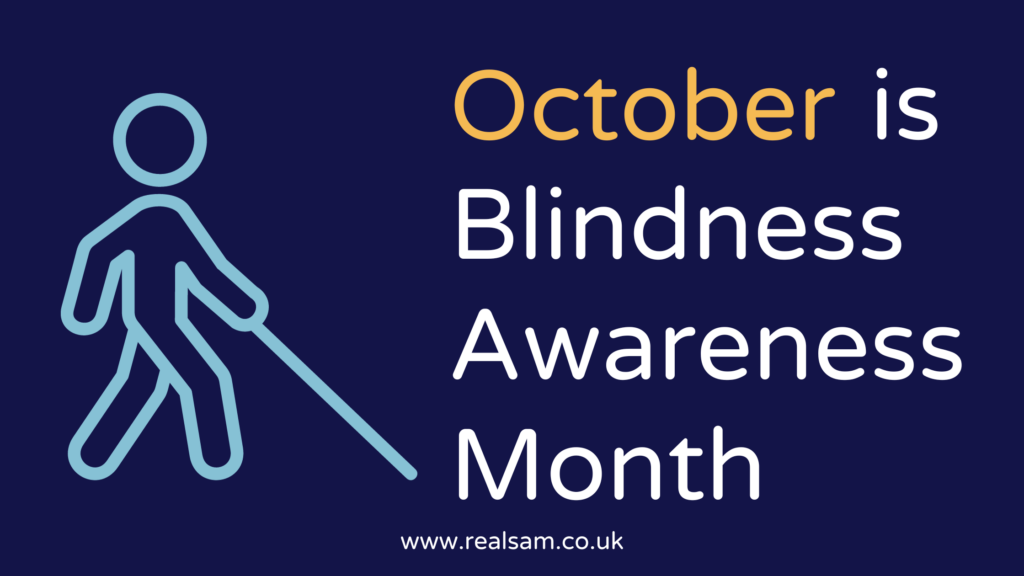As the leaves change colours and the air turns crisp, October marks a special month for our community – Blindness Awareness Month. This month is dedicated to raising awareness about blindness and visual impairments, shedding light on the challenges faced by people living with sight loss and highlighting progress in accessibility.
At RealSAM our mission has been to empower individuals living with sight loss using innovative technology that makes a difference in everyday life. We aim to always prioritise accessibility, and in light of Blindness Awareness Month we want to share our enthusiasm for the future by shining a light on technology that’s breaking barriers for the visually impaired community.
Smart Technology for the Visually Impaired
There’s no other way to say it. Navigating the world with low vision or total blindness is difficult. There are many things that you do not have control over. You can’t easily get to where you need to go, you can’t always read what you need to know, and it’s painful when your lack of vision prevents you from doing things for the ones you love.
It’s difficult, but not impossible. In whatever stage of life we’re in, and whatever degree of vision we have, technology is making success more accessible.
Artificial intelligence (AI) is technology that’s breaking barriers for thousands of blind and visually impaired people all over the world. AI has the power to make things that were previously only accessible by sight now accessible to people with limited or no sight at all.
To put things simply, in today’s digital age, computers are capable of problem solving—and for the visually impaired person, it’s about getting information without seeing, and being able to do things without needing sight.
RealThing AI and RealSAM Devices
AI is continuing to develop; it’s being utilised by different companies and it’s becoming integrated more and more into devices, apps, and other digital products.
RealThing AI is leading in using award winning AI technology to eliminate barriers for the blind and visually impaired. By designing assistive technology that relies on AI, RealSAM devices make it possible for visually impaired users to easily interact and control their mobile phones—something that’s challenging for many visually impaired users when faced with the complexity of today’s smartphones and touch screens.
AI Empowers Users in Everyday Life
AI has many different helpful applications for blind and visually impaired people. If you know about object and text recognition, you have an idea of how AI can be helpful in everyday situations for people with low vision. It’s AI technology that allows the computer to detect objects and text in pictures and provide the user with description that could be read by a screen reader, or an app specifically designed for the purpose. For example, you can take a picture of a cereal box and AI can tell you what it is you’re holding. You can take a picture of your surroundings and get a description of what’s around you.
RealSAM devices have these object and text recognition features included with their video magnifier app. This is helpful for everyday tasks like cooking, identifying labels, reading mail, and so much more.
One thing that’s unique about RealSAM devices is the way AI is used to enable users total control by voice. This makes it easier for people who would have difficulty reading and navigating a touch screen by sight, to do what they want to do on their phones. They can simply say a command like, ‘Add a contact,’ ‘Call my sister,’ and ‘Read my messages.’ Additionally, users can have access to information by asking a question like, ‘What’s the forecast?’ or ‘What’s my location?’
A Brighter Future
AI is improving every day. For example, AI has been capable of identifying items on a menu, or even reading you the whole thing, but today, it’s capable of answering a question like, ‘What’s the cheapest appetiser?’ AI can find this information and then answer follow up questions like, ‘What ingredients does that dish contain?’ AI can go beyond telling you that you’re looking at a car. It can describe it to you and tell you what type of car it is. As it improves, its capability to provide assistance with everyday living is a tremendous step towards independence.
This smart technology is exciting. During Blindness Awareness Month, it’s worth noting that we can look forward to more progress when AI is being used to develop solutions for people with sight loss. After all, technology is meant to make life easier. And when it’s being used to improve accessibility instead of creating barriers, we can look forward to a brighter, more inclusive future.
By Guenivir Kendrick




